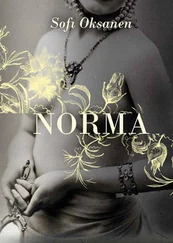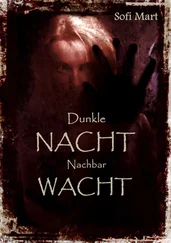It was then that Aliide understood that the only disorder in the house was what remained of her struggle with Hans, from that first time when she came there after Ingel and Linda were taken away. There was no sign that the Chekists had looked for weapons, and the food pantry was clean. Maybe Martin had told them to leave this house in order, that he and his wife were moving into it. Would they have listened to him? Probably not-the Chekists didn’t have to listen to anyone. The only trace of their visit was on the floor. There was dried mud from the men’s boots on the floor in every room. She cleaned away the mud before she started arranging their belongings. She would check the yard later-Lipsi must have been shot and left there.
Aliide picked up a dress and put it in the wardrobe- with her right hand-and her good spirits returned, even if she hadn’t got Martin away for the night. She put her brush on the table under the mirror, next to Ingel’s. Putting her own things in their places made the house feel like she and Hans shared the place. Our home. Aliide would sit there, at the kitchen table, and Hans would sit across from her, and they would be almost like man and wife. She would cook for him and warm his bathwater and offer him a towel when he was shaving. She would do all the things that Ingel used to do for him, all the wifely duties in the house. She would be almost like a wife. Hans would see that she was a better baker and could knit better socks and cook more delicious things. Hans would finally have a chance to see how pretty she was, how sweet she could be, now that Ingel wasn’t tossing her braids in his direction all the time. He would have to talk to her now instead of Ingel. He would have to see her. And above all he would finally have to see that Aliide had her own special qualities, her wonderful knowledge of the secrets of plants and healing. She had always been better at this than Ingel, but who would notice it? It was more important for a proper Estonian farm wife to have a basic knowledge of dough and milking. Who was going to notice that Ingel might flavor her cucumbers with horseradish, but Aliide could use the same root to cure a stomachache? Well, Hans would know it now! Aliide bit her lip. You can’t show off those tricks-pride was the end of every cure, and humility was its beginning, and silence was its power.
But then Martin interrupted her thoughts and tugged her backward, against his hips, and whispered in his little mushroom’s ear, said he was proud of his wife, prouder than he had ever been, and he put his hands on her waist, spun her around the room, and then he fell onto the bed and said, “Now this is a man’s bed! The man of the house! I wonder what all a man could do in a bed like this?”
That night, Aliide woke to a noise like the call of a curlew. Martin was snoring beside her. His armpit smelled. The curlew call was Hans crying. Martin didn’t wake up. Aliide lay in the dark and stared at the striped German pattern of the wall-hanging. Mama had made it. It was embroidered by her hands. How much gold had Ingel taken with her? Enough to buy her freedom? Hardly-as the oldest daughter, her parents gave her maybe ten rubles worth of gold, if that much. Maybe she could use it for enough bread to stay alive.
The next morning Aliide put Ingel’s brush in the bottom drawer of the bureau, the drawer with the broken handle that had to be opened with a knife. She touched the brush only with her left hand.
She found Ingel’s wedding blanket in the drawer. It had a church, and a house as plump as a mushroom, and a husband and wife stitched into the red background. Aliide tore off the six-pointed stars with a pair of scissors, tore the rickrack from around the edge of that map of happiness with her fingers, and the man and wife disappeared from the picture, just like that, the cow just shreds of yarn, the cross on the church nothing but fluff! Aliide was there, too-a lamb, her namesake, was embroidered on it. Ingel had shown off the fruits of her skill and thought Aliide would be pleased, but she hadn’t been thrilled to see her namesake on Ingel’s wedding blanket, and Ingel could tell, and she had run away behind the house crying. Aliide had to go after her and comfort her and say it was a lovely lamb, a beautiful idea, and even though most people didn’t make wedding blankets anymore, Ingel did, and it was lovely. So what if other people thought it was old-fashioned-Aliide didn’t think so. She had rocked Ingel in her arms, and Ingel had calmed down, and she didn’t give up her wedding blanket; she busied herself with it every evening. Mama had a wedding blanket, and there was no wife as happy as Mama. Aliide couldn’t deny that, could she? Aliide couldn’t, but now she was ripping out bits of yarn from the lamb, and from the spruce tree, and soon there was no more map of happiness, just a red background, good wool, from the real lamb, which belonged to her now. Martin peeked in the door, saw Aliide on her knees in a pile of yarn with the scissors in her hand, a knife beside her, her nostrils glowing red and her eyes bright. He didn’t say anything and left the room. Aliide’s steaming breath fogged up the room and spread through the keyhole and filled the house.
Martin went to work; she could hear the door close. She watched him from the window until he was on the main road, then drank some cold water from the big tank and splashed her face, calmed her hot breath. This was her house now, her kitchen. The swallow that nested in the barn would bring luck to her now, and it had permission to bring good luck, real luck, all the magic of toasts that were never made for her marriage, glasses raised under the three lions of the Estonian coat of arms. They could bring such luck, and they were sure to bring it, because these lucky birds did what was right. She was rescuing this house, rescuing her parents’ house from the Russian boots, and rescuing the man of the house. Not Ingel, but him. The land might be lost, but the house remained. Strangers might take the grain from the fields, but the man of the house and Aliide, the new woman of the house, remained. Not everything was lost.
Aliide put the remains of the wedding blanket away in the wardrobe and threw the frayed yarn in the stove, but she saved a pile of it to put in the smoke. Maybe it would have been enough to just burn it, but better safe than sorry, and everyone said that smoking was better than burning. The clothes or a piece of the clothes of the object of unrequited love was always smoked-somebody or other had been smoking things in this village for centuries. There had even been a German countess in the manor house who had been seen smoking the shirt of a reluctant lover, but Aliide couldn’t remember how it was done, how the shirt was put in the smoke-was it hung up to dry in the oven or hung above the midsummer fire? She should have listened more closely to the old people’s stories when she was younger so she wouldn’t have to guess what kind of smoke would work and what kind wouldn’t. She could ask Maria Kreel, of course, but then she would know what Aliide was doing, and it was important to do it without telling anyone. There was something else that you did with the spell, too, but she couldn’t remember what it was. Maybe part of the spell would be enough to do the trick. Aliide stuffed the bundle of yarn into her apron pocket and sat quietly for a moment listening to the house-her house-and felt the trembling of the floor under her feet. Soon she would see Hans, finally sit at the table with him, just the two of them.
She fixed her hair, pinched her cheeks, brushed her teeth with charcoal, and rinsed them for a long time. It was a trick of Ingel’s-that’s why her teeth were always so white. Aliide hadn’t wanted to imitate Ingel too much before, so she had always done without the charcoal. But things were different now. She closed the kitchen drapes and closed the door to the front room, so that no one could see through those windows into the kitchen. Pelmi was running around in the yard. He would bark if someone came to the house- he would bark well before anyone came into the yard. By that time Hans would have easily made it back to the room in the attic. Pelmi was trained to be snappy, which was a good thing.
Читать дальше












